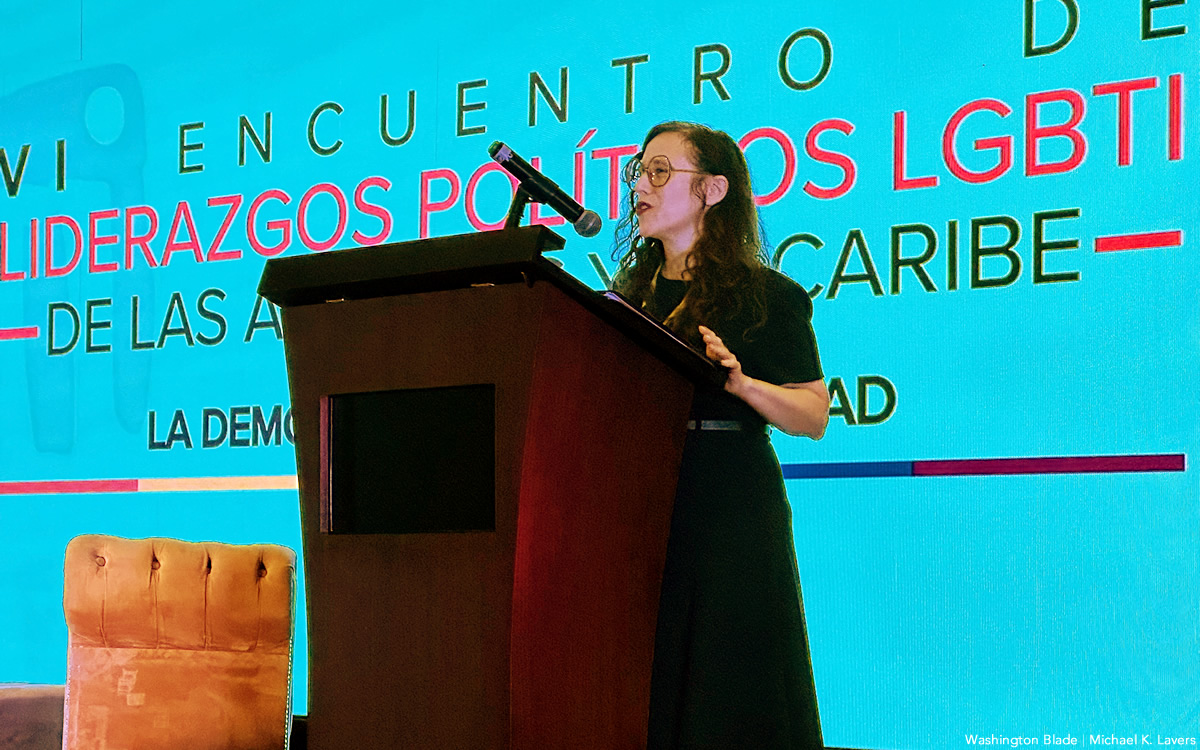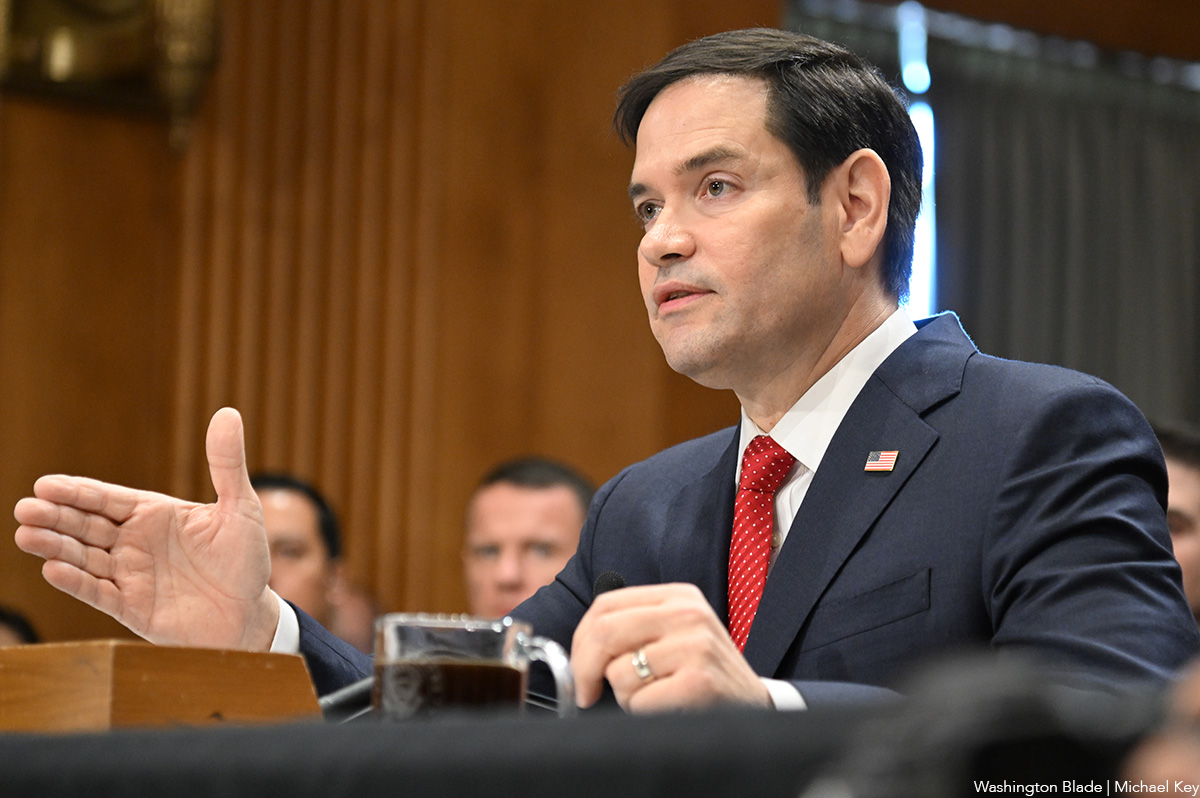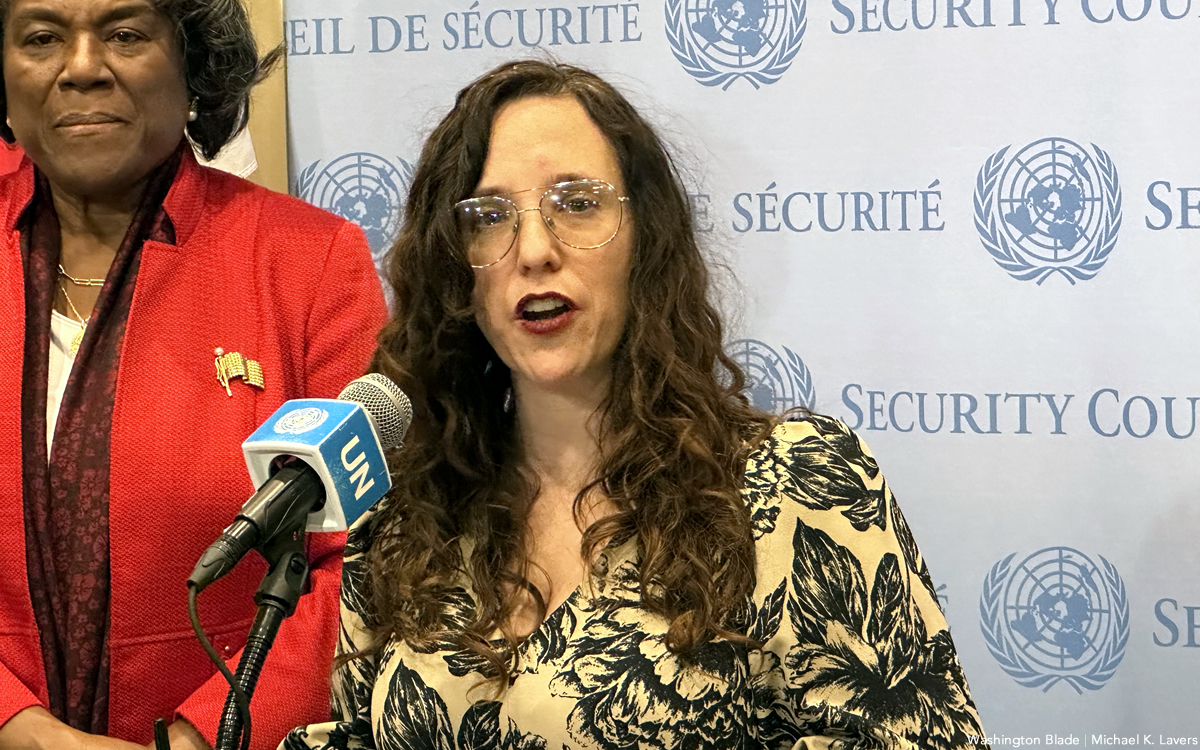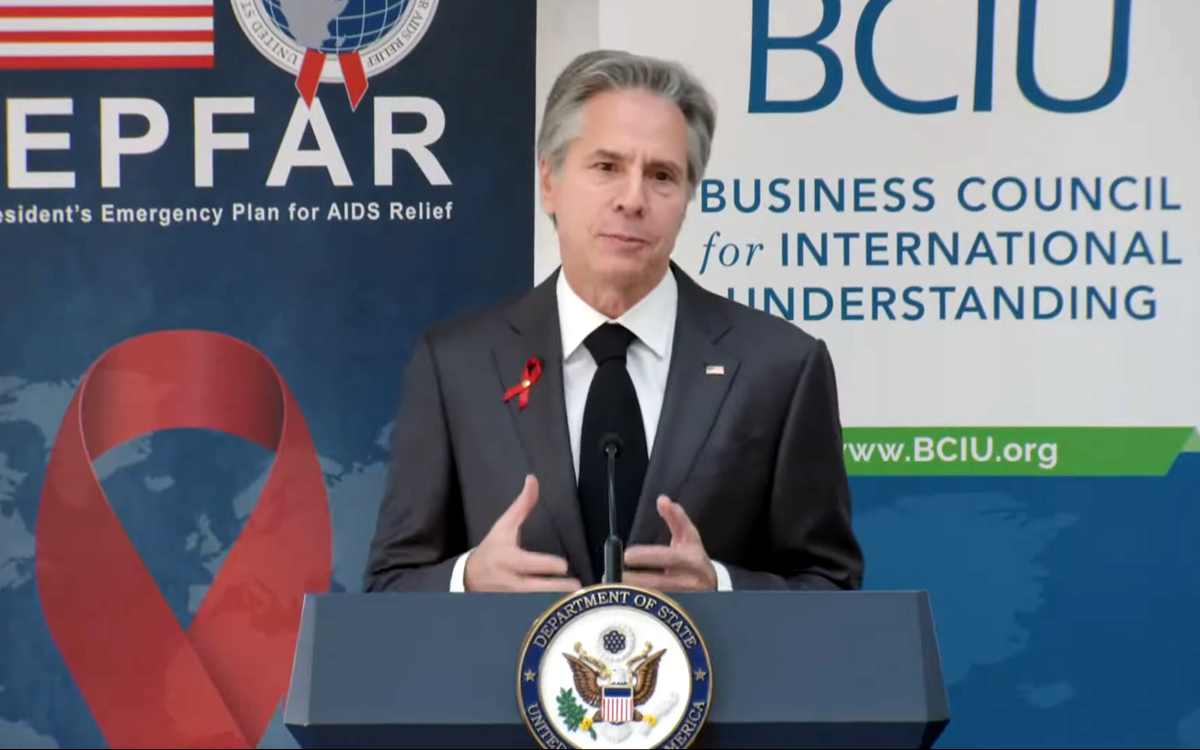State Department
US global LGBTQ, intersex rights envoy speaks at Mexico City conference
Jessica Stern reiterated condemnation of Uganda’s Anti-Homosexuality Act

Editor’s note: International News Editor Michael K. Lavers will be on assignment in Mexico City through Sunday.
MEXICO CITY — The special U.S. envoy for the promotion of LGBTQ and intersex rights abroad on Thursday said politicians around the world target LGBTQ and intersex people as a way to “distract” from their own governance failures.
Jessica Stern spoke at the opening of the LGBTI Political Leaders from the Americas and the Caribbean Conference in Mexico City that the LGBTQ+ Victory Institute co-organized with advocacy groups from Mexico, Colombia, the Dominican Republic, Peru, Honduras and Brazil.
She once again condemned Uganda’s Anti-Homosexuality Act that President Yoweri Museveni signed in May.
The bill contains a death penalty provision for “aggravated homosexuality” and criminalizes the “promotion of homosexuality” with up to 20 years in prison.
“One might argue that a meeting like this could be labelled promotion of homosexuality and we could all be held criminally liable for being in this conference room today,” said Stern.
“[The Anti-Homosexuality Act] includes a duty to report clause that would require doctors, landlords and even family members to report anyone that they have reason to suspect is homosexual and that basically creates a surveillance state for all LGBTQI+ persons just for being,” she added.
Stern said the Anti-Homosexuality Act and similar laws around the world contain provisions that “are intentionally and explicitly vague because the goal is not to keep anyone safe from LGBTQI+ people.” Stern added politicians use hate speech, blackmail, extortion and violence to target LGBTQ and intersex people and make them into “boogeymen.”
“The goal is to distract from crushing issues like corruption and poverty and climate change that don’t have easy solutions,” she said. “Scapegoating LGBTQI+ persons has real consequences. Turning an entire group of people into a threat to your society is not just a useful way to manipulate a domestic populace, in a world connected through social media the threats metastases regionally and globally.”
Stern in her speech cited Human Rights Campaign statistics that indicate more than 500 anti-LGBTQ bills have been introduced in U.S. state legislatures in 2023, with nearly half of them specifically targeting transgender and nonbinary people. Stern noted state lawmakers have approved 70 of them: Fifteen ban gender-affirming care for minors, four “censor” school curricula and two “target drag performances.”
“What an absolute tragedy,” said Stern.
“The truth is the United States is not alone in these anti-LGBTQI attacks,” she added.
Stern noted Thalía Rodríguez, a prominent trans activist, is one of 32 LGBTQ or intersex people who were reported murdered in Honduras in the first 10 months of 2022. Stern also referenced statistics from Colombia Diversa, a Colombian LGBTQ and intersex rights group, that indicate 41 LGBTQ and intersex people — six of whom were activists — were killed in the South American country between January and August 2021.
“This is completely unacceptable, and this is why we come together in rooms like this,” said Stern.
Stern in her speech also highlighted LGBTQ and intersex rights advances in the Americas and the Caribbean.
She noted Antigua and Barbuda, St. Kitts and Nevis and Barbados decriminalized consensual same-sex sexual relations in 2022. Stern pointed out the Brazilian Supreme Court in 2021 ruled a law that seeks to combat domestic and gender-based violence “must be valid for all trans women.”
Stern also referenced the 20 Mexican states that now allow people to update their names and gender markers “via a simple administrative process.”
“This region is setting an example that is inspiring others around the world,” she said.
President Joe Biden in 2021 signed a memo that committed the U.S. to promoting LGBTQ and intersex rights abroad as part of his administration’s overall foreign policy. These efforts include support for marriage equality in countries where activists say it is possible through legislation or the judicial process.
The U.S. has imposed visa restrictions against Ugandan officials after Museveni signed their country’s Anti-Homosexuality Act.
Stern in her speech said the Biden-Harris administration has pledged to combat so-called conversion in the U.S. and around the world. Stern also noted the Global Equality Fund, a U.S.-led initiative that seeks to promote LGBTQ and intersex rights around the world, has given more than $115 million to recipients in more than 100 countries since 2011.
“That would not be possible without the partnership of many governments in this region,” she said.
Stern also noted she is the highest-ranking lesbian woman at the State Department.
State Department
Rubio mum on Hungary’s Pride ban
Lawmakers on April 30 urged secretary of state to condemn anti-LGBTQ bill, constitutional amendment

More than 20 members of Congress have urged Secretary of State Marco Rubio to publicly condemn a Hungarian law that bans Pride events.
California Congressman Mark Takano, a Democrat who co-chairs the Congressional Equality Caucus, and U.S. Rep. Bill Keating (D-Mass.), who is the ranking member on the House Foreign Affairs Committee’s Europe Subcommittee, spearheaded the letter that lawmakers sent to Rubio on April 30.
Hungarian lawmakers in March passed a bill that bans Pride events and allow authorities to use facial recognition technology to identify those who participate in them. MPs last month amended the Hungarian constitution to ban public LGBTQ events.
“As a NATO ally which hosts U.S. service members, we expect the Hungarian government to abide by certain values which underpin the historic U.S.-Hungary bilateral relationship,” reads the letter. “Unfortunately, this new legislation and constitutional amendment disproportionately and arbitrarily target sexual and gender minorities.”
Prime Minister Viktor Orbán’s government over the last decade has moved to curtail LGBTQ and intersex rights in Hungary.
A law that bans legal recognition of transgender and intersex people took effect in 2020. Hungarian MPs that year also effectively banned same-sex couples from adopting children and defined marriage in the constitution as between a man and a woman.
An anti-LGBTQ propaganda law took effect in 2021. The European Commission sued Hungary, which is a member of the European Union, over it.
MPs in 2023 approved the “snitch on your gay neighbor” bill that would have allowed Hungarians to anonymously report same-sex couples who are raising children. The Budapest Metropolitan Government Office in 2023 fined Lira Konyv, the country’s second-largest bookstore chain, 12 million forints ($33,733.67), for selling copies of British author Alice Oseman’s “Heartstopper.”
Former U.S. Ambassador to Hungary David Pressman, who is gay, participated in the Budapest Pride march in 2024 and 2023. Pressman was also a vocal critic of Hungary’s anti-LGBTQ crackdown.
“Along with years of democratic backsliding in Hungary, it flies in the face of those values and the passage of this legislation deserves quick and decisive criticism and action in response by the Department of State,” reads the letter, referring to the Pride ban and constitutional amendment against public LGBTQ events. “Therefore, we strongly urge you to publicly condemn this legislation and constitutional change which targets the LGBTQ community and undermines the rights of Hungarians to freedom of expression and peaceful assembly.”
U.S. Reps. Pramila Jayapal (D-Wash.), Sarah McBride (D-Del.), Jim Costa (D-Calif.), James McGovern (D-Mass.), Gerry Connolly (D-Va.), Summer Lee (D-Pa.), Joaquin Castro (D-Texas), Julie Johnson (D-Texas), Ami Bera (D-Calif.), Mark Pocan (D-Wis.), Lloyd Doggett (D-Texas), Becca Balint (D-Vt.), Gabe Amo (D-R.I.), Ted Lieu (D-Calif.), Robert Garcia (D-Calif.), Dina Titus (D-Nev.), Raja Krishnamoorthi (D-Ill.), Jan Schakowsky (D-Ill.) and Mike Quigley (D-Ill.) and Del. Eleanor Holmes Norton (D-D.C.) signed the letter alongside Takano and Keating.
A State Department spokesperson on Wednesday declined to comment.
State Department
HIV/AIDS activists protest at State Department, demand full PEPFAR funding restoration
Black coffins placed in front of Harry S. Truman Building

Dozens of HIV/AIDS activists on Thursday gathered in front of the State Department and demanded the Trump-Vance administration fully restore President’s Emergency Plan for AIDS Relief funding.
Housing Works CEO Charles King, Health GAP Executive Director Asia Russell, Human Rights Campaign Senior Public Policy Advocate Matthew Rose, and others placed 206 black Styrofoam coffins in front of the State Department before the protest began.
King said more than an estimated 100,000 people with HIV/AIDS will die this year if PEPFAR funding is not fully restored.
“If we continue to not provide the PEPFAR funding to people living in low-income countries who are living with HIV or at risk, we are going to see millions and millions of deaths as well as millions of new infections,” added King.
Then-President George W. Bush in 2003 signed legislation that created PEPFAR.
The Trump-Vance administration in January froze nearly all U.S. foreign aid spending for at least 90 days. Secretary of State Marco Rubio later issued a waiver that allows the President’s Emergency Plan for AIDS relief and other “life-saving humanitarian assistance” programs to continue to operate during the freeze.
The Washington Blade has previously reported PEPFAR-funded programs in Kenya and other African countries have been forced to suspend services and even shut down because of a lack of U.S. funding. Two South African organizations — OUT LGBT Well-being and Access Chapter 2 — that received PEPFAR funding through the U.S. Agency for International Development and the Centers for Disease Control and Prevention in recent weeks closed down HIV-prevention programs and other services to men who have sex with men.
Rubio last month said 83 percent of USAID contracts have been cancelled. He noted the State Department will administer those that remain in place “more effectively.”
“PEPFAR represents the best of us, the dignity of our country, of our people, of our shared humanity,” said Rose.
Russell described Rubio as “ignorant and incompetent” and said “he should be fired.”
“What secretary of state in 90 days could dismantle what the brilliance of AIDS activism created side-by-side with George W. Bush? What kind of fool could do that? I’ll tell you who, the boss who sits in the Harry S. Truman Building, Marco Rubio,” said Russell.

State Department
Former US envoy for global LGBTQ, intersex rights slams Trump
Former President Joe Biden appointed Jessica Stern in 2021

Jessica Stern, the former special U.S. envoy for the promotion of LGBTQ and intersex rights, says the work that she and her colleagues did under the Biden-Harris administration is “being systematically dismantled.”
“As the person who was responsible for leading U.S. foreign policy on LGBTQI+ issues, it’s been very difficult for the past two months to see that work being systematically dismantled,” she told the Washington Blade on March 19 during a telephone interview.
Stern was the executive director of Outright International, a global LGBTQ and intersex advocacy group, when then-President Joe Biden appointed her in June 2021.
The promotion of LGBTQ and intersex rights was a cornerstone of the Biden-Harris administration’s overall foreign policy. These efforts specifically included the decriminalization of consensual same-sex sexual relations and marriage equality efforts in countries where activists said they were possible through the legislative or judicial processes.
The Trump-Vance administration’s decision to freeze most U.S. foreign aid spending for at least 90 days has had a devastating impact on the global LGBTQ and intersex rights movement. President Donald Trump’s executive order that bans the State Department from issuing passports with “X” gender markers has prompted Germany and several other European countries to issue travel advisories for transgender and nonbinary people who are planning to visit the U.S.
Stern said the Trump-Vance administration “has studied the anti-LGBTQI strategies of other countries and basically imported the worst ideas from around the world: The most violent, the most dehumanizing, the most targeting strategies.” Stern added these policies have emboldened Hungarian Prime Minister Viktor Orbán, Russian President Vladimir Putin, Argentine President Javier Milei and other anti-LGBTQ heads of state.
“It’s one thing when a small country that has limited global reach implements anti-LGBTQI laws and policies. It’s another thing when one of the world’s superpowers does so,” Stern told the Blade. “There’s no question that the U.S.’s regression on LGBTQI rights is actually going to accelerate backlash against LGBTQI people around the world.”
“We provide political legitimacy to those ideas, but also we’re forging new alliances and coalitions, and we’re pushing these ideas on other countries,” she added. “So, it’s not a passive action. The U.S. government currently is actively funding and disseminating anti-LGBTQI hatred around the world.”
Former State Department colleagues ‘afraid every day’
The Trump-Vance administration in a Feb. 3 statement that defended its efforts to dismantle the U.S. Agency for International Development noted examples of the organization’s “waste and abuse” included $2 million for “sex changes and ‘LGBT activism'” in Guatemala and $1.5 million to “advance diversity, equity and inclusion in Serbia’s workplaces and business communities.” Secretary of State Marco Rubio last month said 83 percent of USAID contracts have been cancelled, and the remaining will “now be administered more effectively under the State Department.”
Rubio after the Trump-Vance administration froze nearly all U.S. foreign aid spending issued a waiver that allowed the President’s Emergency Plan for AIDS Relief and other “life-saving humanitarian assistance” programs to continue to operate.
The Blade has previously reported PEPFAR-funded programs in Kenya, South Africa, and elsewhere have suspended services and even shut down because of a lack of U.S. funding. UNAIDS Executive Director Winnie Byanyima on March 24 said 6.3 million more people around the world will die of AIDS-related complications over the next four years if the U.S. does not fully restore its foreign assistance.
Stern said her former State Department colleagues are “afraid every day.”
“They never know, ‘Am I going to be fired today?’ “Am I going to be put on administrative leave?’,” she said. “I cannot even imagine what it’s like to go to work every day.”
Stern told the Blade her former colleagues tell her that “there’s not a lot of foreign policy work happening because there’s so much disruption being caused by DOGE (the Department of Government Efficiency).”
“Entire departments have been decimated,” she said, noting one of them has lost 60 people. “It’s almost inconceivable to figure out how to restructure your work when your resources have been decimated.”

Stern described herself as “an eternal optimist” when the Blade asked whether she thinks the U.S. can ever stand for LGBTQ and intersex rights abroad.
“You have to believe in human rights,” she said.
Stern said former Secretary of State Antony Blinken as “an ally on LGBTQI issues.” Stern also said many of her now former State Department colleagues thanked her and her team for their work before they left government.
“There’s so much compassion from straight and cisgendered allies, from career officials, people that are not human rights experts or specialists, people that don’t focus on the well-being of LGBTQI people, but people that care very much about the United States standing for its values, the rule of law, equality for all, and this notion that it is in our national interest to ensure that there is safety, prosperity, and well-being for people around the world,” she said.
“The situation we find ourselves in will not last forever,” added Stern. “What we have to do is figure out how to hold the line right now, and how to organize for the future.”
She stressed ways to “hold the line” include litigation, protests, letters-to-the-editor, demanding accountability from lawmakers.
“There’s so much to do,” said Stern.

Stern is currently teaching at Columbia University’s School of International and Public Affairs, and is writing about her experience as the “first-ever human rights expert to be the special U.S. envoy for LGBTQI rights.” Stern also told the Blade that she is working to launch a new organization.
“I love being an activist again,” she said. “If there was ever a time when activists are needed, it’s now.”
“I am really proud to have rejoined the resistance,” added Stern.


















